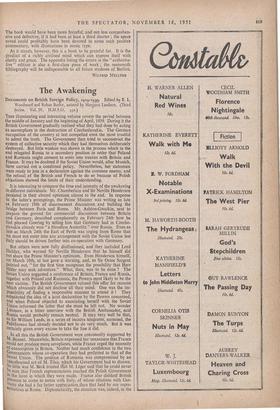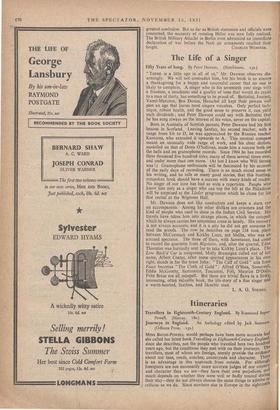The Awakening
Tins illuminating and interesting volume covers the period between the middle of January and the beginning of April, 1939. During it the British Government gradually realised what they had done by acting as accomplices in the destruction of Czechoslovakia. The German occupation of the country at last compelled even the most trustful to admit the truth. The Government then tried to reconstruct the System of collective security which they had themselves deliberately destroyed. But little wisdom was shown in the process which in the end relegated Russia to a secondary position in order that Poland and Rumania might consent to enter into treaties with Britain and France. It may be doubted if the Soviet Union would, after Munich, have carried out a combined policy. Nevertheless, her statesmen were ready to join in a declaration against the common enemy, and the refusal of the British and French to do so because of Polish objections showed the limits of their understanding.
It is interesting to compare the time and intensity of the awakening Indifferent individuals. Mr. Chamberlain and Sir Neville Henderson Persisted in their absurd optimism almost to the end. In response to the latter's promptings, the Prime Minister was writing as late as February 19th of disarmament discussions and building the bridge between Paris and Rome. Mr. Ashton-Gwatkin, sent to Prepare the ground for commercial discussions between Britain and Germany, described complacently on February 24th how he had pleased Goering by telling him that Germany had in Czecho- slovakia already won "a bloodless Austerlitz" over Russia. Even as late as March 24th the Earl of Perth was urging from Rome that We must not enter into any arrangement with the Soviet Union lest Italy should be driven further into co-operation with Germany.
But others were now fully disillusioned, and they included Lord lialifax, who warned Sir Neville Henderson that he himself did not share the Prime Minister's optimism. Even Henderson himself, on March 10th, at last gave a warning, and, as Sir Orme Sargent Pointed out, "for the first time recognises the possibility that Herr Hitler may seek adventure." What, then, was to be done ? The Soviet Union suggested a conference of Britain, France and Russia, together with Poland and Rumania, the Powers most likely to be the next victims. The British Government refused this offer for reasons Which obviously did not disclose all their mind. One was the im- POssibility of finding a responsible minister to attend it I They I sUbstituted the idea of a joint declaration by the Powers concerned, and when Poland objected to associating herself with the Soviet Union informed the latter that she must be left out. No wonder „,1-itvinov, in a bitter interview with the British Ambassador, said Russia would probably remain neutral. It may very well be that, as Sir William Leeds, in a series of incisive telegrams, surmised, the Politbureau had already decided not to do very much. But it was certainly given every excuse to take the line it did.
Jr) all this the British Government were consistently supported by M. Bonnet. Meanwhile, Britain expressed her uneasiness that France could not produce more aeroplanes, while France urged the necessity of conscription in Britain. Neither had much confidence in the two Governments whose co-operation they had preferred to that of the Soviet Union. The position of Rumania was compromised by an 'unauthorised act of M. Tilea, which his Government had to disown. ,So little was M. Beck trusted tliat M. Leger said that he could never ,pe sure that French representations reached the Polish Government In the form in which they were made. France also disliked British pressure to come to terms with Italy, of whose relations with Ger- many. she had a far better appreciation, than that held by our repre- Sentatives at Rome. Diplomatically, the situation was, indeed, in the
greatest confusion. But so far as British statesmen and officials were concerned, the necessity of resisting Hitler was now fully realised. The British Military Attachd in Berlin even advocated an immediato declaration of war before the Nazi air armaments reached their















































































 Previous page
Previous page